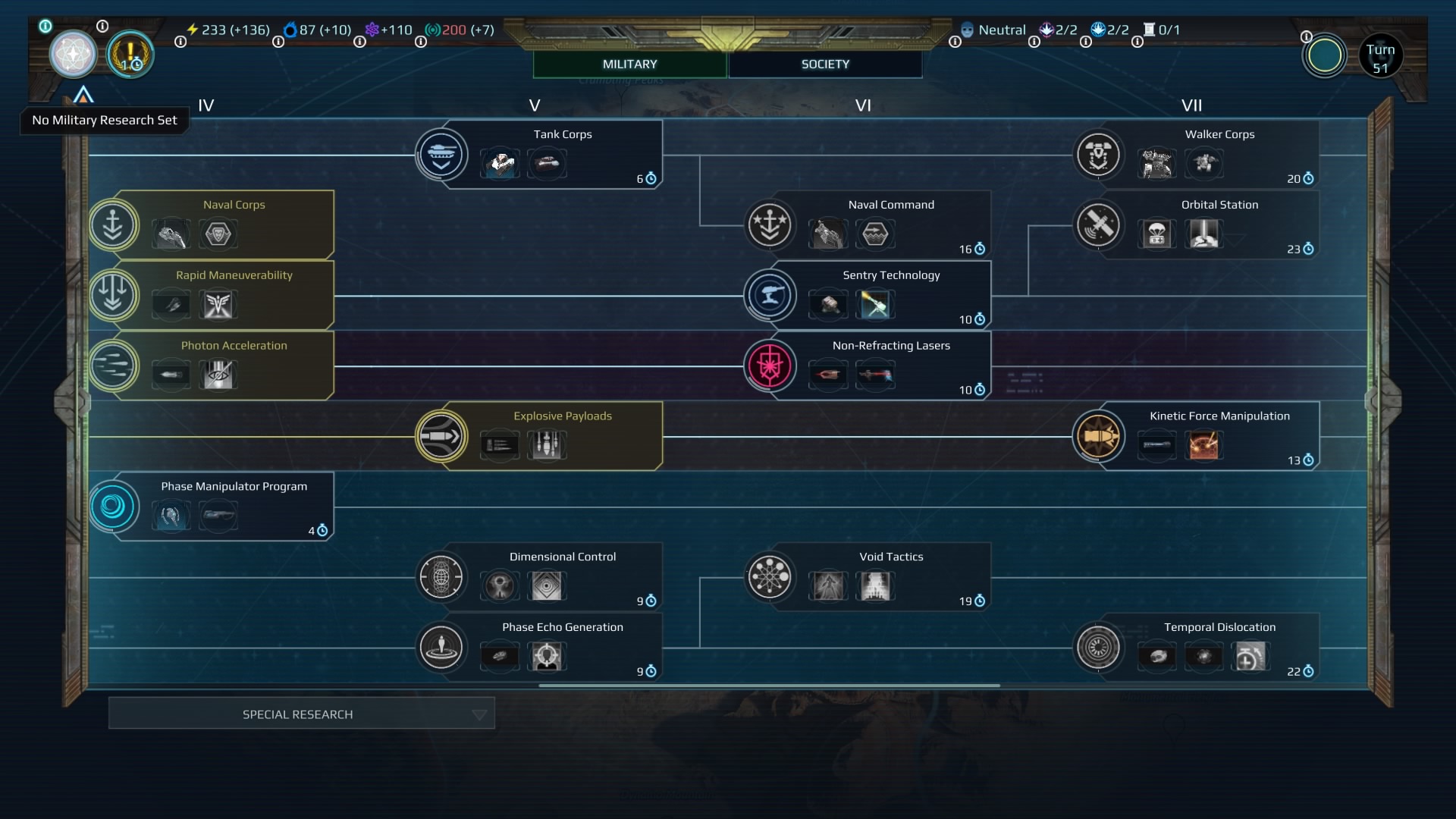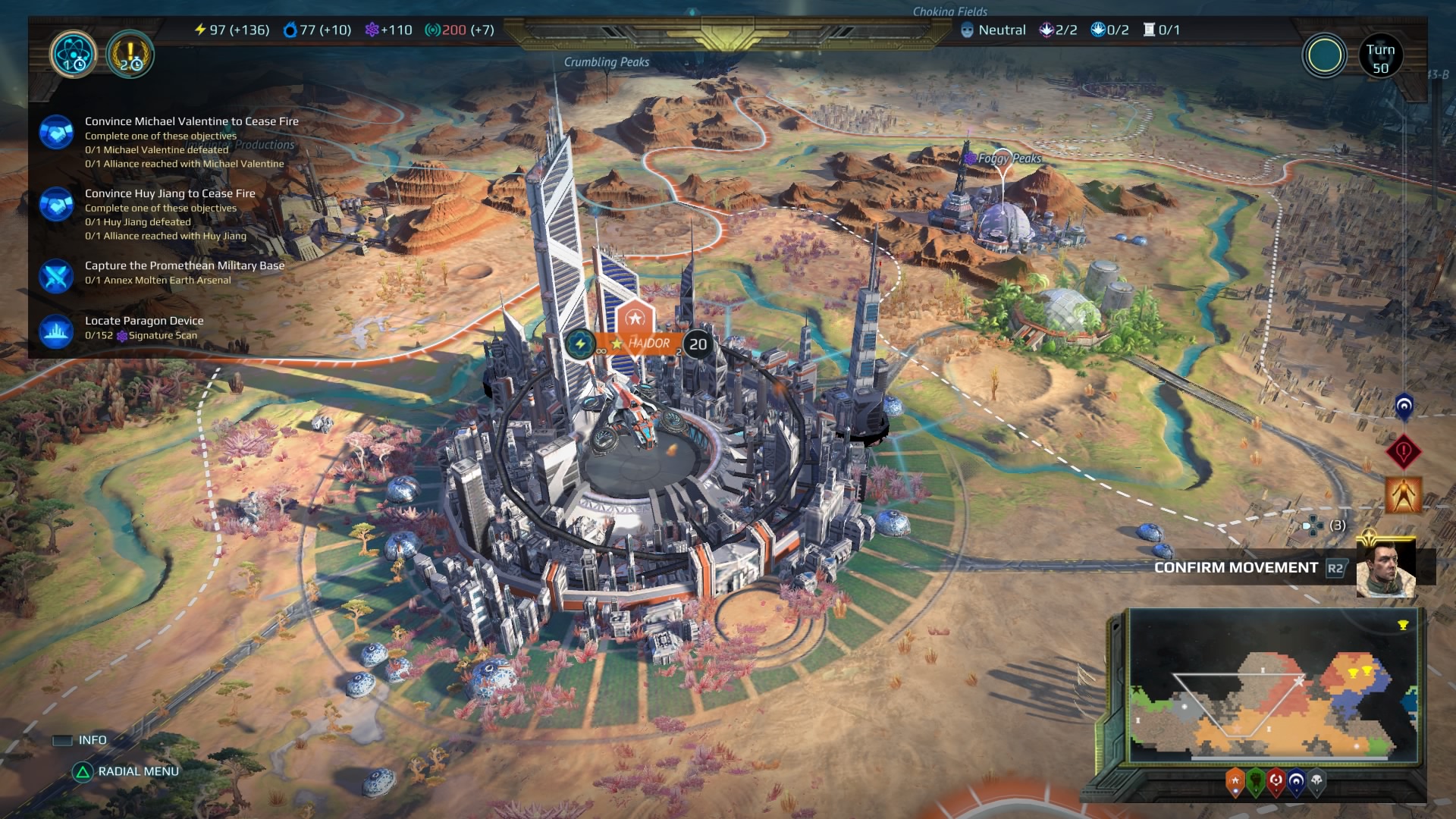In this modern age of game design, genre-melding has become a gimmick critics and consumers alike can all get behind. ”What if this game I loved could play a little like this other game I loved?” The savviest devs swoop in with an answer that changes the way we look at landmark games from then on. Others manage to nail the concept on the surface, yet still fail to be remarkable. Age of Wonders: Planetfall is the latter.
I’ve never played previous Age of Wonders entries, so I don’t know how in line Planetfall is with the rest of the series. I do know that it feels no different than your standard 4X game on a turn by turn basis. You colonize regions on a map, adjusting the resources you gain from each and the production your settlements output. There’s a map to explore and patrol. You can employ diplomatic solutions for problems with your neighbors. You win by being the nicest, most technologically advanced, or being the last nation standing.

Genre-Tinkering
I will say that Planetfall feels A LOT like other games in the genre. In ways, it’s an assimilation of what strategy games have become in recent years. It tweaks these standard elements in small ways, but not enough ways to stand out over its contemporaries. It borrows much of Civilization’s well-worn design, and is more than happy to leave it mostly intact. The pace is a bit faster than Civ. You’ll be guided through all the relevant action items on a given turn with the simple press of a button. You won’t need to fumble through screens to check up on the cooling relationships between other factions unless it affects you directly.
Will all the little efforts it makes to streamline the act of playing the game, Planetfall lets some of its other 4X remain unnecessarily bloated. For example, tech trees seem to sprawl on into an endless oblivion of words that won’t mean anything to you until you’ve played several games. Oddly, the trees are separated by societal and military functions. Further, each of those trees are subdivided by like groups of advancements. Clearly there was an effort to make this historically frustrating function more tenable. That effort seemed to fall short of the actual answer, which is just “make less tech trees.”

Star Warring
Combat is where you find Planetfall doing its most iterative repurposing of games from other genres. In normal 4X games, when enemy armies occupy the same space at the same time, math does the fighting for you. Here, you can hunker down and engage directly with the combat, playing it out over a small, hex-based tactical map. It looks and feels like XCOM on the surface, except these maps are far smaller and often way more dense with things to hide behind and interact with. Outside of assaulting cities, no side has more than six units to play with. These battles can go quickly, and the various tactical options available to you makes each spat engaging.
Like Endless Legend, each faction in Planetfall has a relatively small number of unique units available to them. They get their diversity from the various ways you can customize them. Mod slots can give troop weapon ammunition the ability to burn targets and the ground around them. Some mods just add passive armor, or give units entirely new abilities. You can mess around with the unit template feature forever, churning out pimped out units with fun bells and whistles worth starting fights over.

Hero units can take the customization features even deeper. They can equip special weapons and armor, as well as gain levels and learn new abilities and expand their parameters. They can become the backbone of your squads, providing interesting synergies with more rank and file units that you wouldn’t get otherwise.
Banal-punk
I wish Planetfall’s campaign was inspired more by the real-time strategy games that had come before it. I have no solution for the issue of telling a compelling linear story with the 4X game as a medium. But Planetfall’s banal campaigns are a great example of how not to do it.

It’s starts off interestingly enough. The Star Union’s best captain, Jack Gelder, is out on a mission when all of the planets in this human federation lose communication with one another. They can’t fly back in light speed, so they have to make the 200 year journey back in cryosleep. When they get back home, they find that their Union has collapsed, and their worlds are now in the midst of centuries old paradigm and power shifts.
The game you play from then on is knee deep in almost every sci-fi cliche you can think of. Not that sci-fi should avoid android brothels or hive-minded bug people. But there’s space to really engage with any of these topics in a way that’s substantial. In Planetfall, it’s just a throwaway quest on a list of many throwaway quests.

The goals that the campaign provides forces you to travel to places on the map in ways that you would never do if you were just playing a random scenario. It seems counterproductive to learning how to play this, and other games like it, competently. Since these campaigns are both devoid of any compelling story and lack any valuable tutorialization, you could really just skip them entirely.
Alas, if you’re coming to Age of Wonders: Planetfall for a brand new angle on games you’ve played before, then you’ve come to the wrong place. It’s novel to see several different recognizable mechanics blended into one genre soup. The final product isn’t better than the sum of its parts, though. It makes the 4X a faster game to play, but not a better one, ultimately.
Age of Wonders: Planetfall review code provided by publisher. Reviewed on a PS4. For more information on scoring, please read our Review Policy.
-
Quickens the pace of the standard 4X
-
XCOM-like combat shines
-
Unit customization is a lot of fun
-
Campaign is rote and boring
-
Too many options that fell ultimately meaningless
-
Sci-fi setting is beautiful, yet shallow.





